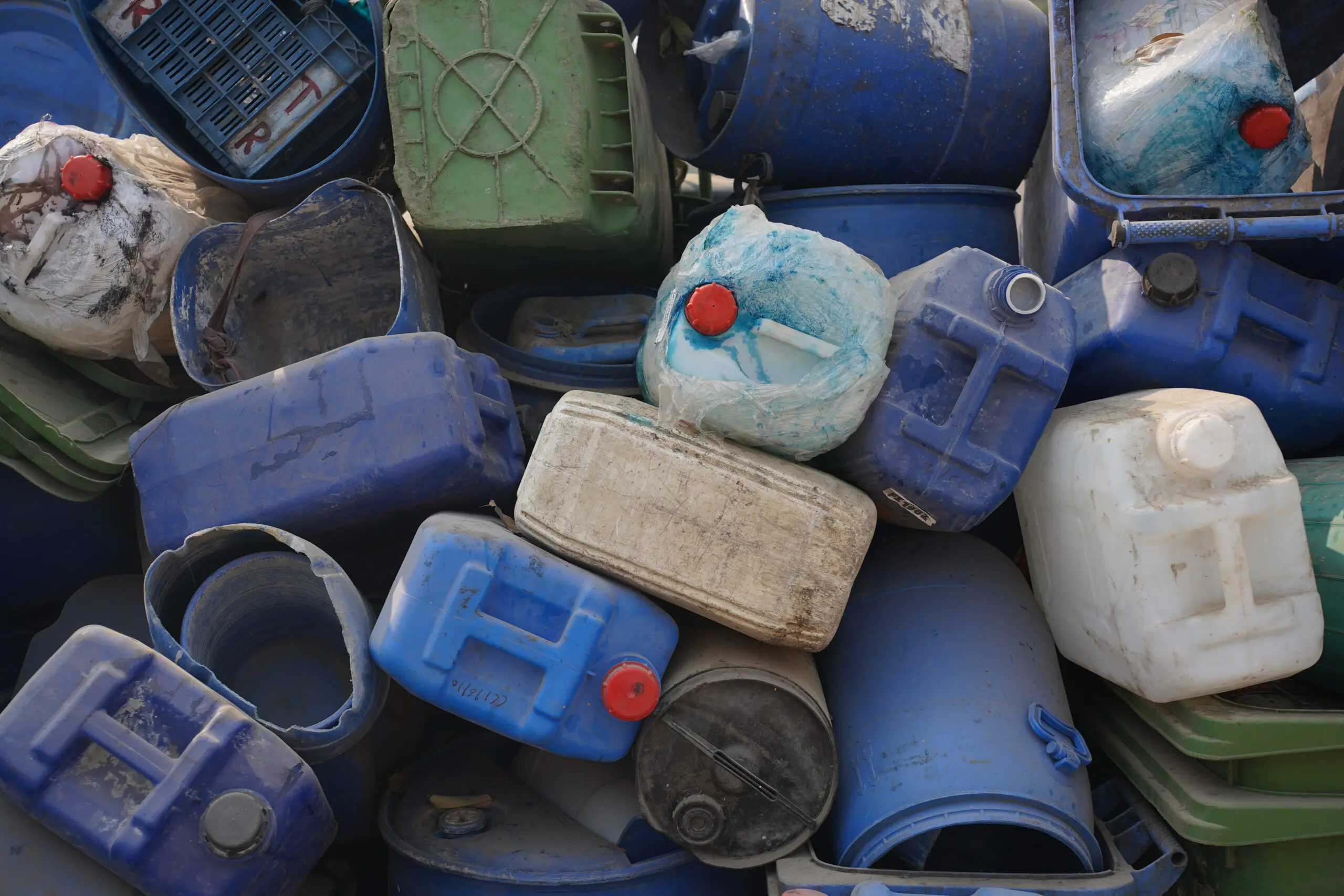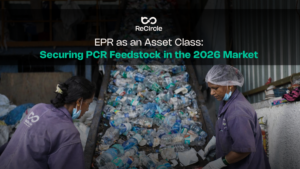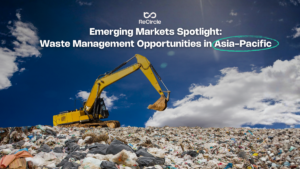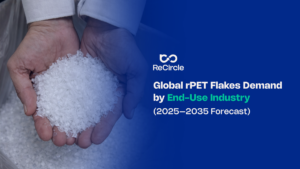Introduction
Across the world, recycling and sustainability are no longer optional; they are essential. Governments, companies, and consumers are all rethinking how plastic waste should be handled and reused. Europe is leading this global shift through its strong Extended Producer Responsibility (EPR) policies, which make producers accountable for the life cycle of their plastic packaging.
These regulations are creating a surge in demand for recycled polyethylene terephthalate (rPET) flakes that are used to make bottles, containers, and films.
At ReCircle, we see firsthand how Europe’s EPR rules are not only reshaping its domestic recycling systems but also influencing international markets, including India. In this blog, we explain how these European policies are driving change, what they mean for rPET recycling in India, and how we are helping to bridge global demand with responsible recycling practices at home.
What Are Europe’s EPR Policies and Why They Matter
EPR is a policy framework that holds producers responsible for managing the waste generated from their products. Simply put, if a company sells plastic bottles, it must ensure those bottles are collected, recycled, and not left to pollute the environment.
Europe has been a frontrunner in enforcing EPR for packaging waste. The European Union (EU) has introduced strict rules for plastic packaging, particularly for PET bottles.
Some key milestones include:
- By 2025, all beverage bottles in the EU must contain at least 25% recycled PET.
- By 2030, this requirement increases to 30%.
- Member countries must collect 77% of PET bottles by 2025, rising to 90% by 2029.
These policies have turned recycled PET into a critical commodity. Companies must now secure a steady supply of high-quality rPET flakes to meet legal and sustainability goals. At the same time, strict quality and traceability rules ensure that rPET used in rPET packaging is safe and food-grade compliant.
For India, this shift signals a growing global market that values quality recycling, traceability, and environmental responsibility all areas where we are rapidly advancing.
How Europe’s Policies Are Reshaping the Global rPET Market
Europe’s EPR framework has transformed rPET from a “good-to-have” material into a business necessity. This transformation is creating ripple effects across the global plastics value chain.
Here are three major changes we observe:
- Rapid growth in demand
The worldwide market for rPET flakes is expanding quickly. Valued at around USD 11 billion in 2024, it is projected to grow to nearly USD 29 billion by 2033. Much of this growth comes from Europe’s push for recycled-content packaging. Beverage, FMCG, and cosmetic companies are all competing for limited supplies of high-quality rPET. - Supply shortage in Europe
Even with advanced collection systems, Europe faces a shortage of recycled PET. Demand exceeds local recycling capacity. This opens new opportunities for markets like India, which can supply clean, traceable, and certified rPET flakes to global buyers. - Stronger quality and traceability standards
European buyers now prioritise recyclers who can provide clear documentation and maintain consistent quality. They want to know where the waste came from, how it was processed, and whether it meets safety standards. This has raised the global bar for rPET production a change that benefits responsible recyclers worldwide.
At ReCircle, we welcome this shift. It promotes accountability and pushes the recycling industry toward greater transparency and technological innovation.
What This Means for India
India already has one of the world’s most active recycling ecosystems. According to industry estimates, we recycle over 80% of our PET waste a rate higher than many developed countries. Informal waste collectors, small-scale recyclers, and local entrepreneurs play a vital role in this achievement.
However, Europe’s policies are influencing the Indian recycling landscape in several ways:
- Export potential is growing
European demand for high-quality recycled material creates a new export market for Indian recyclers. Companies here are upgrading their plants with better washing, sorting, and extrusion technology to produce food-grade rPET flakes. Many are also pursuing global certifications such as EFSA or US FDA compliance to meet European buyer requirements. - Domestic EPR implementation is strengthening
India’s own Plastic Waste Management Rules now mandate EPR for producers, importers, and brand owners. This alignment with international standards is encouraging more Indian brands to recover and recycle their packaging waste. Through our traceable collection network, we help companies meet both regulatory and sustainability commitments in an accountable way. - Quality and transparency are key differentiators
As the market becomes more global, Indian recyclers are realising that success depends not just on volume but on traceability. Buyers want proof that the flakes come from post-consumer waste and are processed responsibly.
At ReCircle, we ensure this through our digital traceability platform every kilogram of plastic collected is recorded, tracked, and verified across its journey from waste to recycled resource.
The Role of rPET Flakes in Sustainable Packaging
The majority of the demand for rPET flakes comes from the packaging industry. rPET packaging reduces the need for virgin plastic, cuts energy use, and lowers carbon emissions all while maintaining product safety and quality.
In Europe, rPET bottles have become a standard for sustainable packaging. In India, this trend is gaining pace as more brands commit to recycled-content goals. Several beverage and FMCG companies are now introducing packaging made with up to 30% rPET, with long-term plans to increase it further.
This transformation is not only about compliance. Consumers today are conscious of their environmental footprint. They prefer brands that take visible action on sustainability. Using rPET packaging is one of the most direct ways for companies to demonstrate that commitment.
The Challenges Ahead
While the momentum around circular packaging is strong, the transition comes with challenges that India must address strategically:
- Improving collection and segregation
A large part of India’s plastic waste is still collected through informal systems. Mixed waste, contamination, and lack of segregation make recycling more difficult. We need stronger collaboration between local governments, waste management companies, and communities to improve collection efficiency. - Investing in modern recycling infrastructure
Producing food-grade rPET flakes requires advanced washing and extrusion technology. Many recyclers are upgrading, but greater investment and technical support are needed to scale up across the country. - Policy stability and clarity
To attract large-scale investment, India’s recycling and EPR policies need to remain clear and predictable. Consistent enforcement will help create confidence among recyclers, brands, and investors. - Competing with virgin PET prices
When virgin PET prices drop, rPET becomes less competitive. Strong EPR enforcement, mandatory recycled-content targets, and consumer awareness can help stabilise rPET demand in such situations.
At ReCircle, we view every challenge as an opportunity. Strengthening collection systems, improving recycling technology, and building transparent supply chains will make India’s recycling sector more resilient and globally competitive.
How We at ReCircle Are Building the Circular Future
Our mission at ReCircle is to make resource recovery organised, transparent, and inclusive. For nearly a decade, we have been creating systems that bring traceability and accountability to India’s recycling ecosystem.
Here’s how we are contributing to the global movement for circular materials like rPET flakes:
- Building inclusive collection networks
We partner with waste pickers, collection centres, and communities across India to recover post-consumer plastics. Every piece collected is weighed, sorted, and documented to ensure transparency. - Ensuring traceability through technology
Our digital platform tracks every kilogram of waste from collection to final recycling. This provides brands and recyclers with verifiable data that helps them meet EPR and sustainability targets confidently. - Supporting recyclers and brands
We bridge the gap between recyclers and companies that require certified recycled materials for their packaging. This collaboration ensures stable supply, fair prices, and measurable impact. - Promoting awareness and behavioural change
Beyond operations, we run education and awareness programmes to help people understand the importance of responsible waste management and the value of materials like rPET flakes.
What the Future Holds
Three major trends will define the future of rPET recycling in India and globally:
- Policy alignment across regions: As more countries adopt EPR, the demand for rPET will continue to grow.
- Data and digital traceability: Verified and transparent recycling data will become essential for both local compliance and global trade.
- Social inclusion: Formalising the role of informal waste workers will ensure fair livelihoods while improving material recovery rates.
India is well-positioned to become a key supplier of rPET flakes and a leader in sustainable packaging innovation. With a strong informal recycling base, improving infrastructure, and growing corporate responsibility, the country can play a major role in meeting global circular economy goals.
Conclusion
Europe’s EPR policies have redefined the value of recycled materials. rPET flakes are no longer a by-product of waste but a globally traded resource driving sustainability.
For India, this represents both a challenge and an opportunity. With growing rPET recycling capacity, technological improvements, and policy support, we can strengthen our domestic circular economy while contributing to global sustainability goals.
At ReCircle, we are proud to be part of this change. By connecting waste collectors, recyclers, and brands through our traceable platform, we are ensuring that plastic never becomes waste, it becomes a resource with renewed purpose.
The path ahead is clear: collaboration, responsibility, and innovation will define the next era of rPET packaging and recycling in India. And we at ReCircle are committed to leading that journey.
Frequently Asked Questions (FAQs)
• Mixed and contaminated waste
• Limited access to advanced washing & extrusion technology
• Need for stronger policy enforcement
• Competition from cheaper virgin PET
Solving these issues requires collaboration among recyclers, brands, and government, supported by digital traceability.




